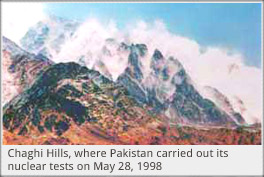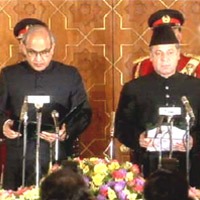As scheduled, elections were held on February 3, 1997. Pakistan Muslim League won with an overwhelming majority with absolutely light and slight opposition. The Muslim League was able to obtain a two-third majority in the National Assembly and Mian Nawaz Sharif was re-elected as Prime Minister. He obtained a vote of confidence from the National Assembly on February 18, 1997.
A number of very important Constitutional Amendments were introduced during Nawaz Sharif’s second term. These include the termination of the Eighth Amendment, passing of the Thirteenth Amendment and the Ehtesab Act, 1997. Nawaz Sharif faced a serious confrontation with the Judiciary and the Executive, which eventually led to the resignation of President Leghari on December 2, 1997.

It was during this term that Pakistan carried out its nuclear tests on May 28, 1998, in response to the Indian detonation of its five nuclear devices. The Nawaz Government had found it imperative for Pakistan to carry out these nuclear tests, in order to provide an effective defense, and to deter Indian adventurism.
The Nawaz Government proclaimed an emergency on May 28, 1998; the day these nuclear tests were conducted. All fundamental rights were suspended and all the foreign currency accounts in Pakistani banks were frozen. On August 28, 1998, Nawaz regime introduced the Fifteenth Amendment. The Bill generated heated debate throughout the country but was passed on October 9, 1998, by the members of the National Assembly. The Bill, however, was not put before the Senate within 90 days as was required by the Constitution. The Bill was held back, as Nawaz Sharif did not had the required two-third majority in the Senate.
The Fifteenth Amendment was presumed to be an effort by Nawaz Sharif to acquire additional powers for himself. Soon a serious conflict and confrontation emerged on the scene between him and the Military Generals. This confrontation led to the resignation of General Jehangir Karamat on October 7, 1998. General Karamat was replaced by General Pervez Musharraf.

The Kargil Operation in its aftermath again led to tense relations between Nawaz Sharif and the armed forces. This tension culminated into the removal of Nawaz Government by General Pervez Musharraf on October 12, 1999, thus bringing to an end the second term of Nawaz Sharif’s Government.
This article was last updated on Sunday, June 01, 2003






